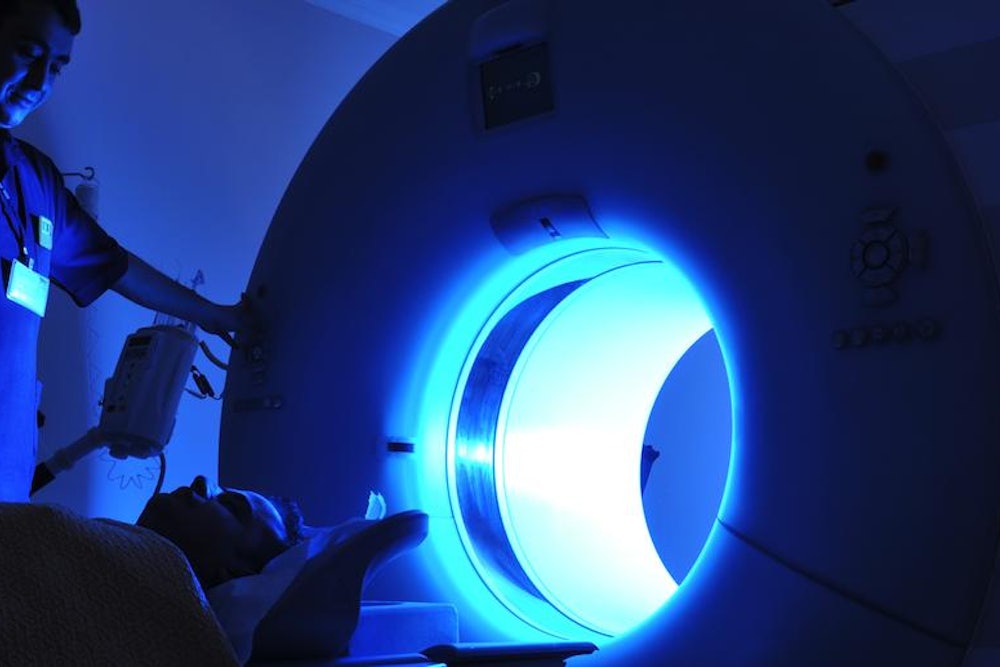The funding bill that House Republicans sent the Senate over the weekend calls for a one-year delay in implementation of Obamacare—a demand that, as even most Republicans seem to realize, neither Senate Democrats nor President Barack Obama will accept.
But the bill included another provision related to Obamacare: repeal of a tax on the medical device industry. The tax is not popular: In a symbolic vote two years ago, 30 Democrats joined Republicans in stating their opposition to the tax. Could the tax be the basis for some kind of last-minute compromise—a way to give House Republicans something, in exchange for relenting on their threats to shut down the government and breach the debt ceiling?
A senior Democratic aide in the Senate gave me a one-word answer: “No.” That’s the right attitude—and not simply because the tax is arguably worthwhile.
The tax is a 2.3 percent excise levy on every medical device sold and used in the U.S. That’s everything from cardiac stents to medical scanners to artificial hips to surgical gloves. The tax will raise about $30 billion over ten years, according to official estimates. That money will help pay for the expansion of Medicaid and subsidies for private insurance that will help poor and middle-class Americans pay for their insurance.
Like every other provision in the Affordable Care Act, the medical device tax has its detractors and defenders, its liabilities and virtues. Critics of the tax say it will slow innovation and cause layoffs, by reducing revenue and ultimately profits for the companies that manufacture these devices. They also say it will push device-makers overseas. Proponents say that the industry is enormously profitable. They say that the device makers can expect new business, because millions of people will suddenly have health insurance, and that the new revenue will partially if not completely offset any lost revenue. The tax applies equally to wares made here and abroad, they point out, so there’s no incentive to move manufacturing facilities overseas.
You can get a sense of the arguments against the device tax by reading John Graham—a Forbes columnist, investment analyst, and former vice president at AdvaMed, the trade group for the device industry. For a defense of the tax, you can read a brief by Paul van de Water from the Center on Budget and Policy Priorities. And for an argument on why the tax won’t hurt innovation, I recommend reading Merrill Goozner, author of The $800 Million Pill and now the editor of Modern Healthcare magazine. Critics note that some high-profile device companies have laid off workers lately. On the other hand, the industry as a whole has seen declining bargaining power for a while, for reasons that have nothing to do with the health care law—and a lot to do with hospitals, which pay for the devices, bargaining harder on prices. And like all reports of job losses that may or may not be related to Obamacare, they should be seen in the context of a health care industry that has been adding jobs—and will continue to be adding jobs once the new health care law is fully in place.
Among those who think the impact of the device tax is tepid are some device makers themselves. My colleague Alec MacGillis quoted one in his article about Senator Elizabeth Warren, who had joined calls for changing or eliminating the tax:
in reporting my piece on Warren, I heard convincing arguments in favor of the tax from ... several executives of medical device making firms in Massachusetts! Bob DeAngelis, an executive with Katahdin, told me that he had no problem with the tax and didn’t see it having much impact on his 150-person firm. “I’m not terribly upset we’re going to have a tax on medical devices. I think it’s overblown,” he said. “Scott Brown says we ‘shouldn’t be taxing the job creators.’ That sounds great but what does that mean. He’s not talking about me. I’m going to hire based on people buying my product.”
But the merits and demerits of the device tax are, at this point, utterly beside the point. Nobody is stopping Republicans from proposing a measure to repeal the device tax. In fact, the House already passed a bill that would do just that. But it hasn’t passed the Senate for one simple reason: Republicans couldn’t come up with alternative revenue sources. Their only proposals are to let the deficit go up a little or to cut Obamacare’s subsidies and Medicaid expansion—in other words, to deprive people of health insurance. Democrats won’t go along, and so there’s an impasse.
If Republicans continued to work through the normal process, they could probably negotiate some kind of change. Among those known to oppose the tax are liberal Democrats from Massachusetts (Warren) and Minnesota (Al Franken) because those states have powerful device companies in their states. (Back when the law first went through the Senate Finance Committee, John Kerry led a successful crusade to reduce the size of the tax.) But by attaching the device tax to this new government-funding bill, Republicans are essentially trying to impose their will upon Democrats. As they are with the one-year delay of Obamacare, they aren’t negotiating: They are threatening to shut down the government if they don’t get their way. Harry Reid, Senate Democrats, and President Obama would be nuts to discuss this possibility under such a threat. Fortunately, it seems like they understand that.
Image via Shutterstock.
